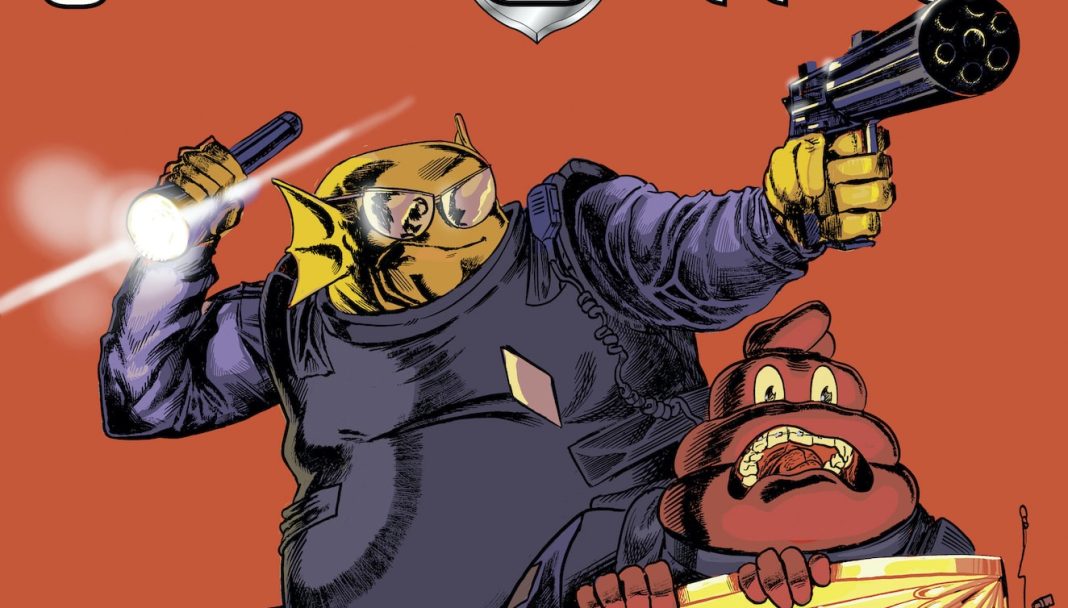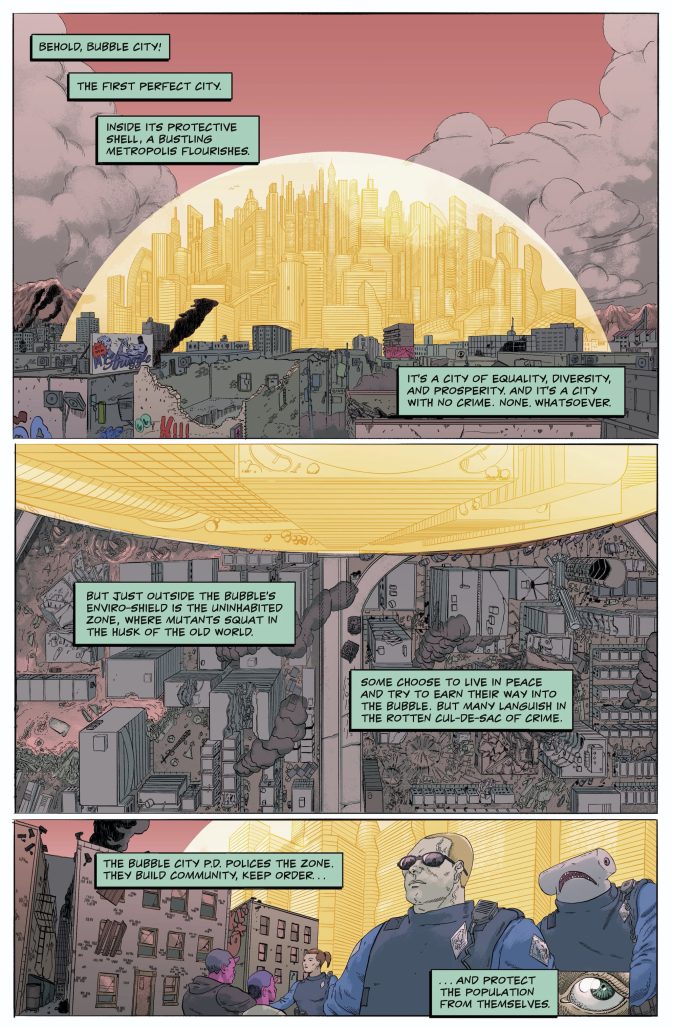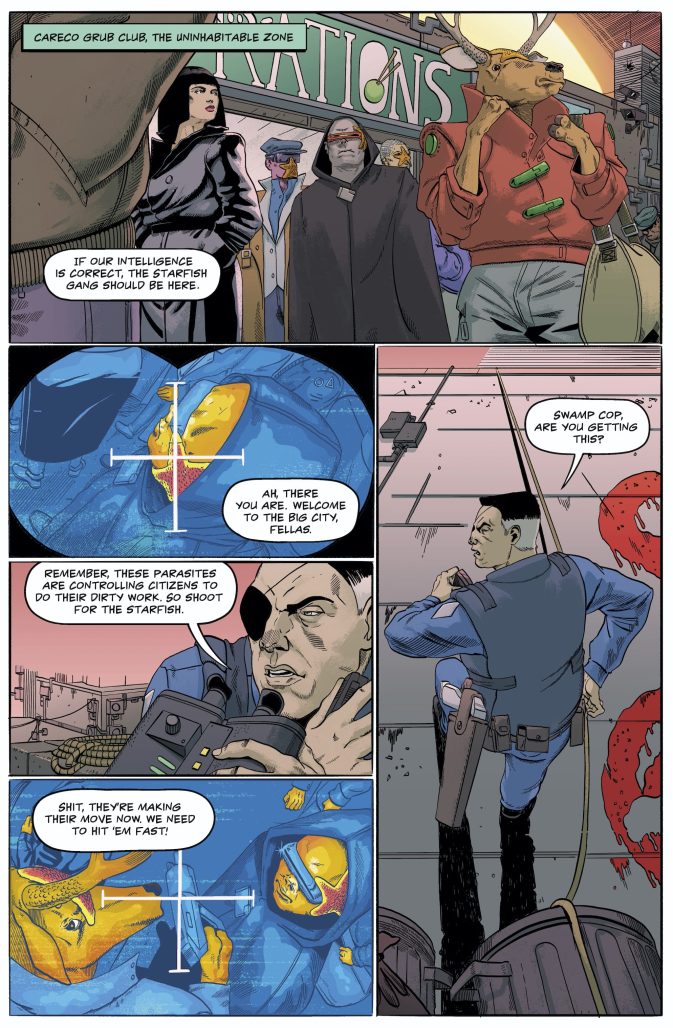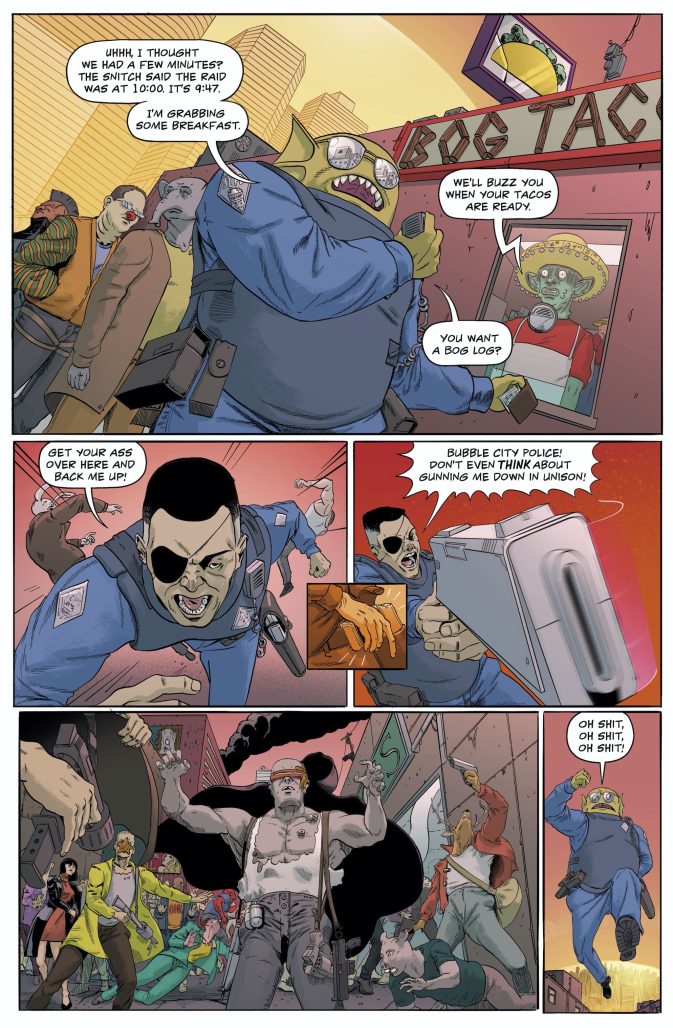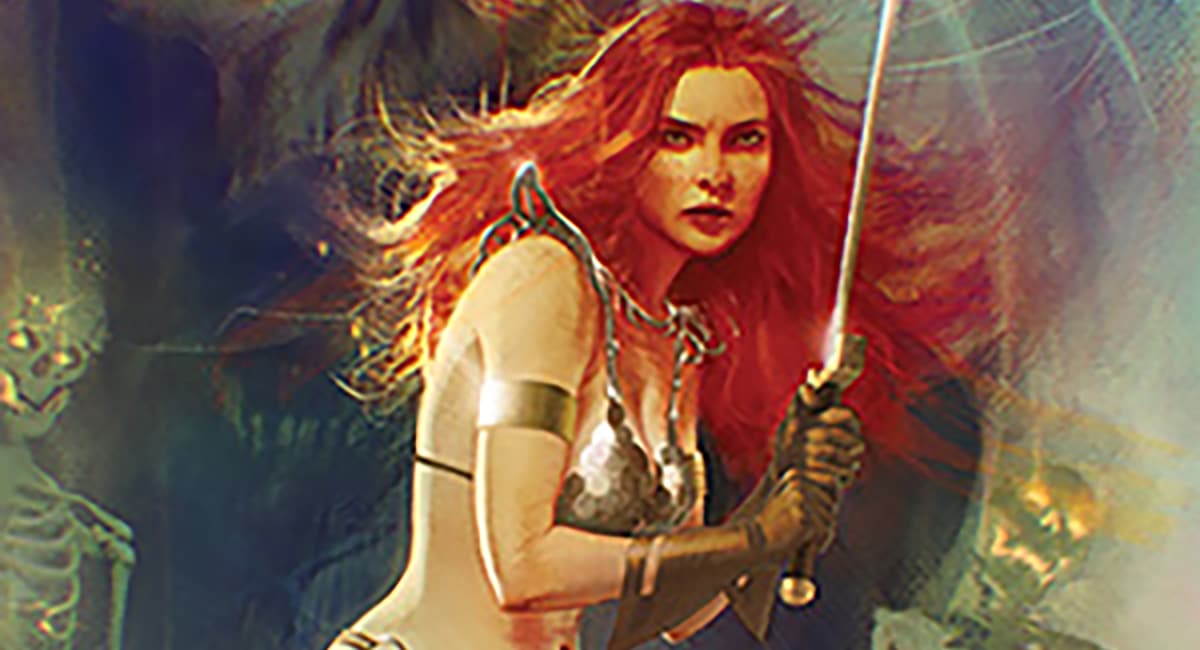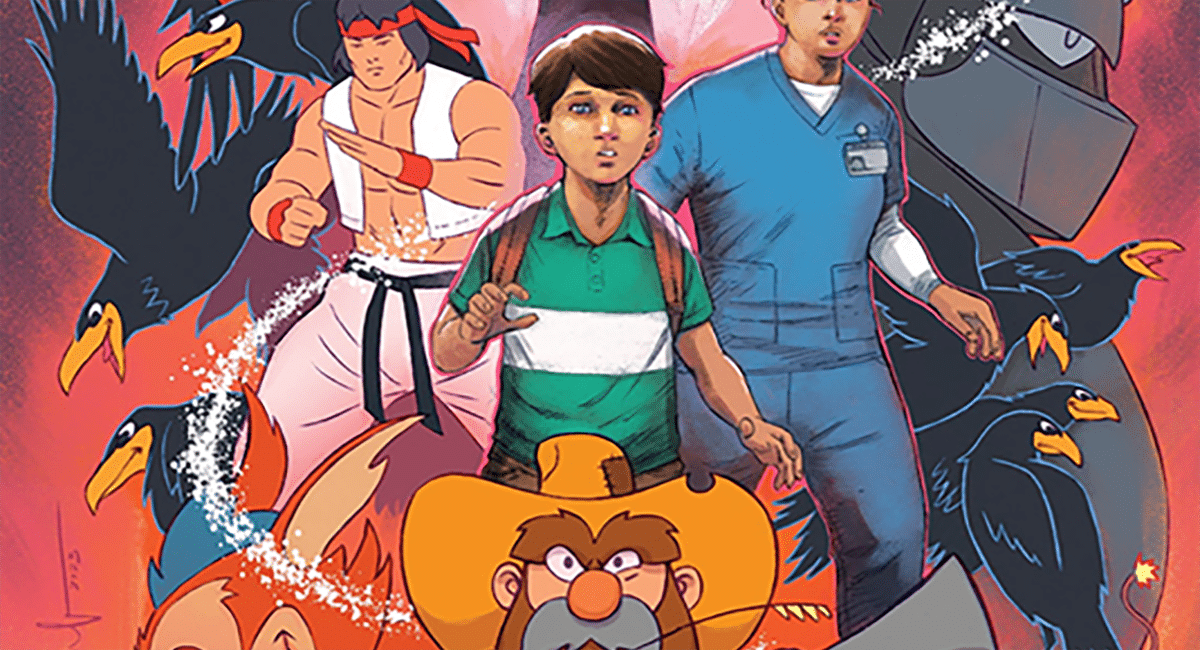From The Nib founder and Pulitzer Prize Finalist Matt Bors and acclaimed filmmaker and illustrator Ben Clarkson comes Justice Warriors, a witty critique of the ills that plague our modern lives. Published by AHOY Comics, the series follows Swamp Cop and Cadet Schitt, two officers protecting Bubble City from the mutants of the Uninhabited Zone. From faulty self-driving vehicles to the bread economy, the series is a no-holds-barred satire from start to finish.
The Beat sat down with Bors to discuss the development of the series, plans for future stories, and an exclusive short only in the trade, ahead of the release of the collected edition (in stores everywhere today).
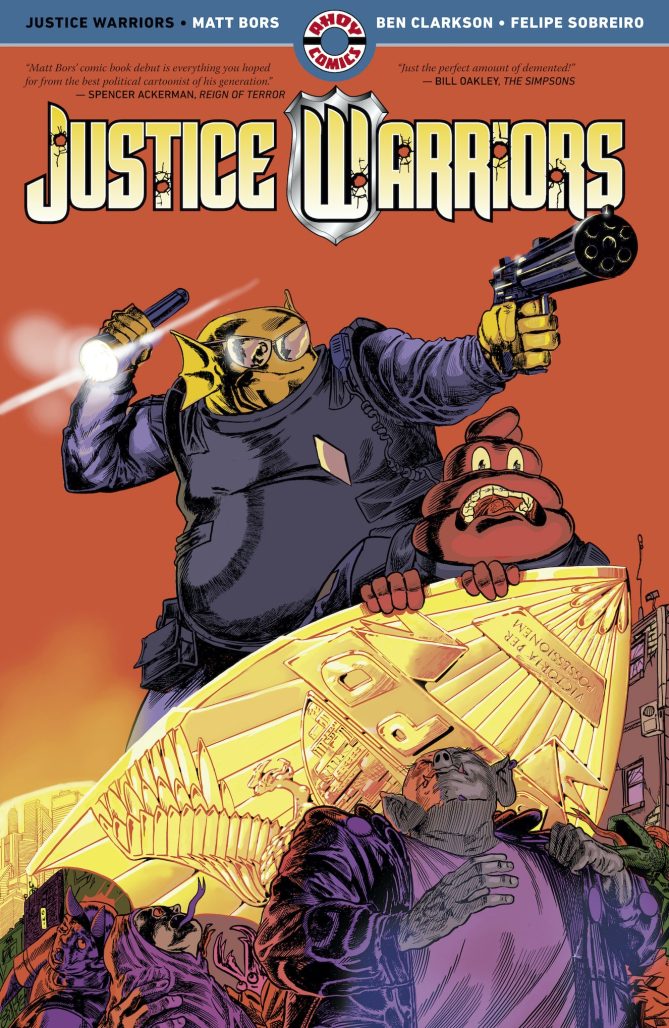
Cy Beltran: Although this is a tale set in the future, much of this story is rooted in what’s happening across the world now, from the systemic corruption within policing to self-driving cars and the pitfalls of social media. What about the current moment did you feel was most important to tap into?
Matt Bors: The current moment is so many things at once, it’s an omni-crisis of politics and attention—that’s what felt important to tap into, that sense of frenzy you can barely keep up with. The focus of Justice Warriors is obviously cops, but we wanted to go broader than just that with our critique and include social media derangement, celebrity culture, investment schemes, mass movements, A.I. It’s all there on multiple levels from the plot down to background jokes that are packed into the art.
Beltran: There’s a wonderful frenetic pace to this story, and I’m curious to know how you and Ben decided what material to focus on from chapter to chapter?
Bors: Ben and I would come up with these absurd premises like bread investment and helicopter crime and those would be the major action and plot beats for each issue. We started with the premise that a rapid boom-and-bust economy would necessitate hasty schemes to stabilize markets and those would in turn create new problems and novel forms of criminal activity that need to be suppressed by force. Like society. In each issue our leads, Swamp Cop and Schitt, have to mop up the mess created by the leadership. The city is governed by The Prince, a famous pop star. His main goal appears to be adulation and self-enrichment (stop me if this sounds familiar) so he isn’t particularly well-suited for the job.
Eventually, the main antagonists appear amid all this disruption: The Libra Gang. They are led by Zozo, a young woman who starts recruiting other disenfranchised mutants from the UZ. Their beef with Bubble City and the police is understandable but, of course, they have their own problems. Instead of any material explanation for why things are the way they are, the Libra Gang subscribes to an armed astrology-based ideology.
Beltran: Joe [Grunenwald, Managing Editor for the Beat] was able to speak with you on this a bit the last time you chatted with the Beat, but I wanted to ask you about the developmental stage for this story and what most impacted the trajectory of the overall arc?
Bors: Without trying to sound too high-falutin’, I think the main thing that impacted the trajectory of the story was mine and Ben’s thoughts on how political structures dictate outcomes more than individual choices. I’d give away the end if I talk specifics, but we knew how we wanted this to end and plotted it tightly before we started. A lot happens in the final issues that brings small things we planted in the beginning to fruition, both large and small, the consequential and the absurd.
Beltran: The backmatter at the end of each chapter is simply delightful, and includes a one-page strip written and illustrated by you. How did you decide what to spotlight for the interstitials and what to focus your one-pagers on?
Bors: The interstitials take the form of rap sheets and police reports, so that allowed us to add a little most to the story and show you how the Bubble City Police function. The one-page strips I did mostly have nothing to do with the main story, but hopefully give readers a wider view of this world of the Uninhabited Zone and The Bubble. There was no grand reasoning on these; I went with my best ideas.
Beltran: I see a lot of Judge Dredd in this. What were some of the more influential stories for you and Ben when developing this world and its inhabitants?
Bors: I’m a huge Dredd guy, make no mistake about it, but I should acknowledge Ben developed the main characters before we met. We wanted to make something even more unglued and humorous without leads who were genuinely tough and competent. We show that grizzled action veteran in the beginning in Swamp’s partner, Rogers, who we immediately off in the most humiliating way we could conjure: getting flattened by a self-driving bus while crossing the road.
Another influence we’re specifically nodding to in the final act is Ghost in the Shell and how it deals with artificial intelligence. Beyond that, I think we’re unabashedly pulling from a lot of different places and trying to create a chaotic mutant-infested city that tops the most sensory-overloading cities in all of comics and animation.
Beltran: There are a ton of moments in here where I was chuckling to myself as I was going through the story (shoutout to the Bread King). Without getting too far into spoiler territory, is there a gag that sticks out to you as your favorite?
Bors: There’s a two page spread in the final issue that was planned since day one—a big payoff, a huge moment in the action with a massively detailed spread drawn by Ben, but really just an absurd joke we’d been building on since issue 1 with the bus. That one’s spoiler territory, so not what you asked for.
Really, I like so many of the small jokes we wrote or Ben inserted in the background of the art because that’s the type of thing we wanted to accomplish with this series. Trying to pack as many astrology-related terms and concepts into the Libra Gang’s statements was probably the most fun I had writing anything in a while.
Beltran: Do you and Ben have any future plans for this world that you can talk about?
Bors: There’s an exclusive six-page backup story in the trade that I wrote and drew and we are developing more stories for Justice Warriors now. There’s enough solid ideas to do this for ten volumes. The world is a story-engine and we’ve always planned on this being a long-running series.
Beltran: Finally, do you have a one sentence pitch as to why somebody should pick up Justice Warriors (or a message for those who missed it the first time around)?
Bors: This is a wild new creator-owned series at a time when it’s harder than ever to launch new worlds and keep them going. Get on the bus.
The collected edition of Justice Warriors is now available in bookstores, comic shops, and digitally.


